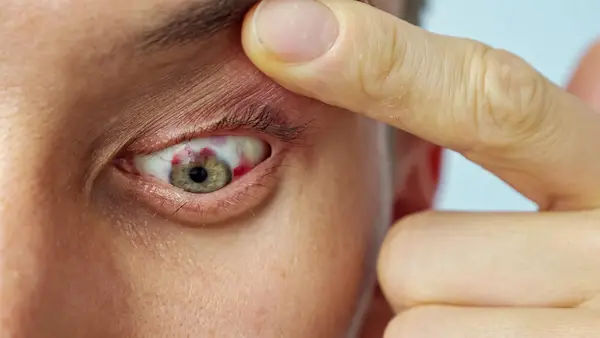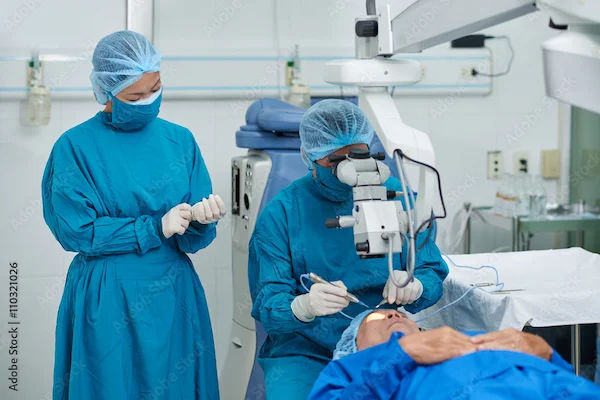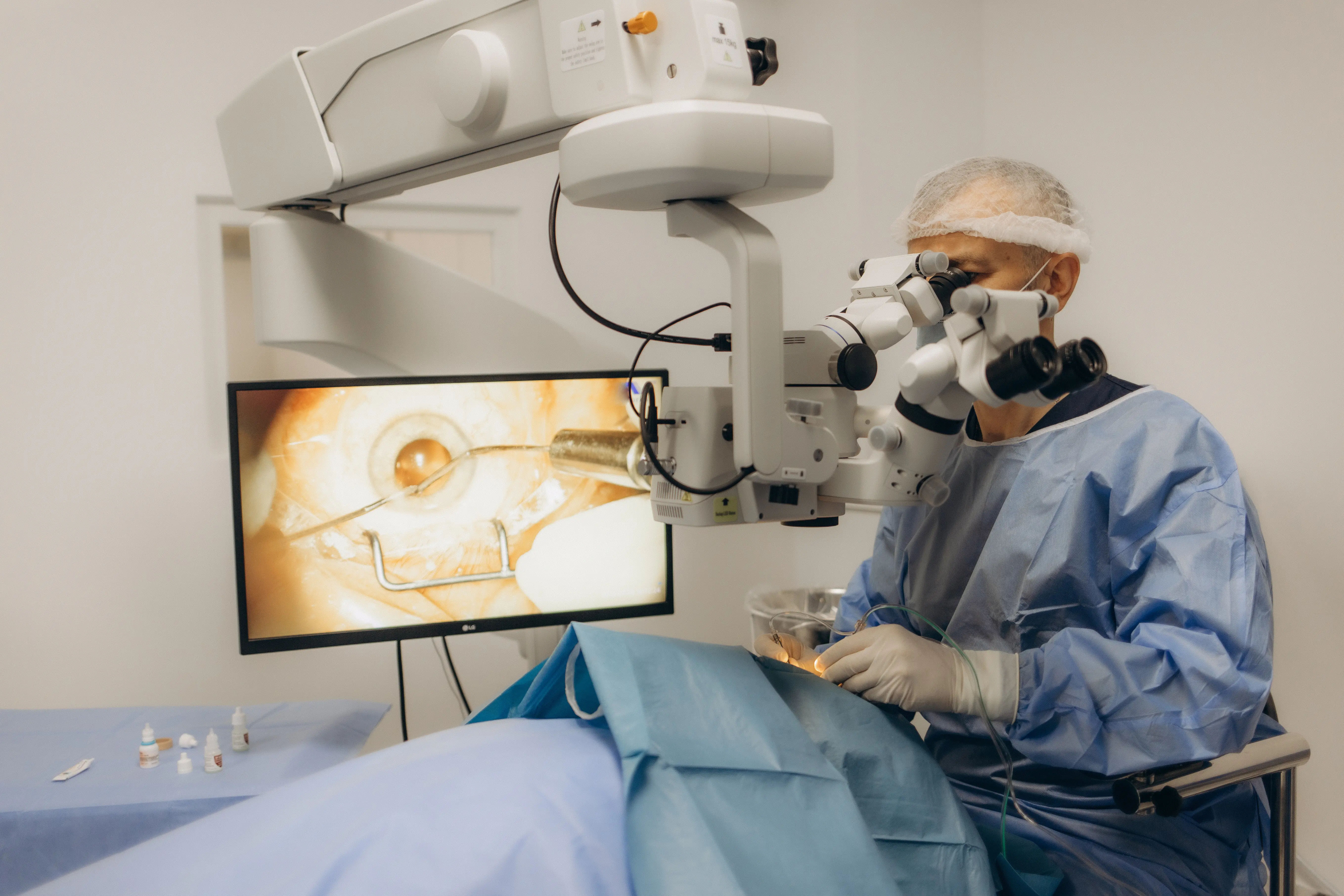Shadows And Ghosting After Cataract Surgery
Experiencing shadows or ghosting after cataract surgery? Learn the common causes, from residual astigmatism and dry eyes to IOL issues, and explore potential solutions for clear, comfortable vision post-op. Find out what to expect.

Written by Dr.Sonia Bhatt
Last updated on 13th Jan, 2026

Introduction
Cataract surgery is a common and highly successful procedure that helps restore clear vision by replacing a cloudy lens with an artificial one. However, some patients may experience visual disturbances like shadows or ghosting after the surgery. While these effects can be concerning, they are often temporary and manageable.
In this article, we’ll explain what shadows and ghosting mean, why they happen, and how you can deal with them.
What Are Shadows and Ghosting After Cataract Surgery?
The shadows and ghosting after cataract are:
Shadows: Some patients notice faint dark areas or "shadows" around objects, making vision appear slightly dimmer or less sharp.
Ghosting: This refers to seeing a faint duplicate or "ghost" image next to the real object, similar to a double vision effect.
These issues can make reading, driving, or recognizing faces a bit challenging, but they usually improve with time.
Why Do Shadows and Ghosting Happen After Cataract Surgery?
Several factors can contribute to these visual disturbances:
Healing Process – Your eye needs time to adjust after surgery. Swelling or mild inflammation can temporarily affect vision.
Dry Eyes – Surgery can temporarily reduce tear production, leading to blurry or distorted vision.
Residual Refractive Error – If your new artificial lens isn’t perfectly aligned or if you have astigmatism, it may cause ghosting.
Posterior Capsule Opacification (PCO) – Sometimes, the thin membrane behind the artificial lens becomes cloudy, causing visual disturbances.
Multifocal or Toric Lenses – Some advanced lenses (used for correcting presbyopia or astigmatism) may initially cause slight ghosting until your brain adapts.
How Long Do These Effects Last?
For most people, shadows and ghosting improve within a few weeks to months as the eye heals. However:
If caused by dry eyes, artificial tears can help.
If due to PCO, a quick laser procedure (YAG capsulotomy) can clear the vision.
If related to lens misalignment or residual astigmatism, glasses or a minor adjustment may be needed.
If symptoms persist beyond 3-6 months, consult your eye doctor.
Consult Top Gynaecologists
Tips to Manage Shadows and Ghosting
Tips to manage shadows and ghosting:
Give It Time – Your brain needs a few weeks to adapt to the new lens.
Use Prescribed Eye Drops – Antiinflammatory and lubricating drops help with healing and dryness.
Wear Sunglasses – Bright light can worsen ghosting; polarized sunglasses help.
Adjust Lighting – Soft, even lighting reduces glare and shadows when reading.
Try Different Glasses – If needed, your doctor may prescribe glasses for finetuning vision.
Stay Hydrated – Drinking enough water helps maintain tear production.
Avoid Rubbing Your Eyes – This can slow healing and increase irritation.
When to See a Doctor?
While mild ghosting or shadows are normal initially, consult your ophthalmologist if you notice:
Worsening vision instead of improvement.
Severe double vision that doesn’t go away.
New flashes of light or floaters, which could indicate a retinal issue.
Your doctor may recommend:
A YAG laser procedure (if PCO is the cause).
Adjusting your glasses prescription.
Further tests to rule out other conditions.
Final Thoughts
Shadows and ghosting after cataract surgery are usually temporary and part of the healing process. Most patients see significant improvement within weeks. If you’re concerned, don’t hesitate to reach out to your eye specialist for reassurance and guidance.
If you’re experiencing persistent vision issues after cataract surgery, Apollo 24|7 makes it easy to consult an ophthalmologist or schedule a followup test. Your clear vision matters—let’s make sure it stays that way!
Consult Top Gynaecologists
Consult Top Gynaecologists

Dr. Vineet Mishra
Infertility Specialist
36 Years • MD, Phd, DSc
Ahmedabad
Apollo Hospitals - Gandhinagar, Ahmedabad, Ahmedabad

Dr. Wahida Suresh
Obstetrician and Gynaecologist
27 Years • MBBS, DNB, MNAMS Obstetrician & Gynaecologist, Fertility Specialist
Chennai
Apollo Speciality Hospitals OMR, Chennai
(175+ Patients)

Dr Bhawna Garg
Gynaecological Oncologist
26 Years • MBBS, MS, (PGI MS ROHTAK) FELLOWSHIP GYNECOLOGY ONCOLOGY, (CANCER INSTITUTE CHENNAI)
Delhi
Apollo Hospitals Indraprastha, Delhi

Dr. Vandana Sinha
Obstetrician and Gynaecologist
14 Years • MBBS, MS(Obs & Gyn), Fellow in Gynec-Onco. & Gynec Endoscopy
Ahmedabad
Apollo Hospitals Gandhinagar, Ahmedabad
(200+ Patients)

Dr. Shruti I
Obstetrician and Gynaecologist
7 Years • MBBS, MS (OBSTETRICS & GYNAECOLOGY)
Bangalore
Apollo Clinic Bellandur, Bangalore
Consult Top Gynaecologists

Dr. Vineet Mishra
Infertility Specialist
36 Years • MD, Phd, DSc
Ahmedabad
Apollo Hospitals - Gandhinagar, Ahmedabad, Ahmedabad

Dr. Wahida Suresh
Obstetrician and Gynaecologist
27 Years • MBBS, DNB, MNAMS Obstetrician & Gynaecologist, Fertility Specialist
Chennai
Apollo Speciality Hospitals OMR, Chennai
(175+ Patients)

Dr Bhawna Garg
Gynaecological Oncologist
26 Years • MBBS, MS, (PGI MS ROHTAK) FELLOWSHIP GYNECOLOGY ONCOLOGY, (CANCER INSTITUTE CHENNAI)
Delhi
Apollo Hospitals Indraprastha, Delhi

Dr. Vandana Sinha
Obstetrician and Gynaecologist
14 Years • MBBS, MS(Obs & Gyn), Fellow in Gynec-Onco. & Gynec Endoscopy
Ahmedabad
Apollo Hospitals Gandhinagar, Ahmedabad
(200+ Patients)

Dr. Shruti I
Obstetrician and Gynaecologist
7 Years • MBBS, MS (OBSTETRICS & GYNAECOLOGY)
Bangalore
Apollo Clinic Bellandur, Bangalore




